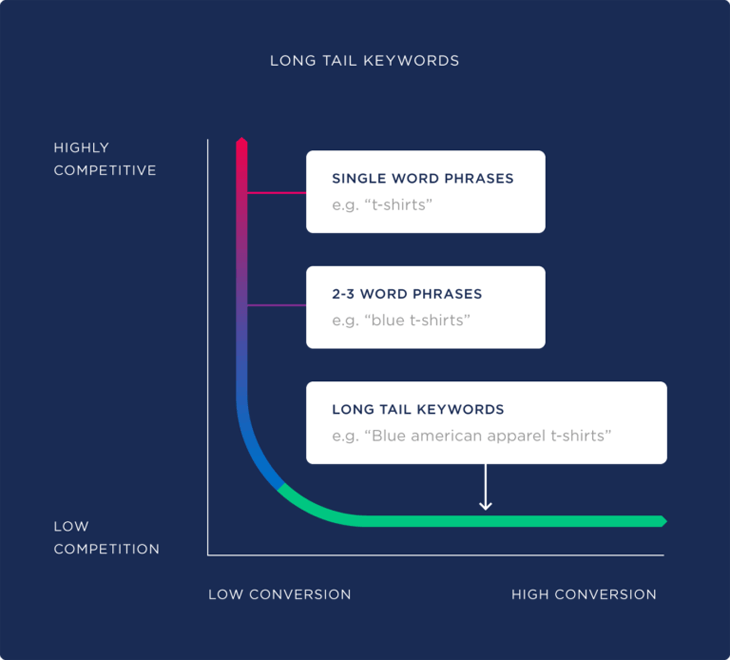Unlock the secret to skyrocketing your website’s traffic with these expert tips on selecting the perfect long-tail keywords.

Image courtesy of via DALL-E 3
Table of Contents
Welcome to our guide on how to choose long-tail keywords for better targeting! In this section, we’ll introduce you to the world of long-tail keywords and explain why they are essential when creating online content.
What are Long-Tail Keywords?
Long-tail keywords are phrases that are more specific and longer than generic keywords. They usually consist of three or more words and target a niche audience. For example, instead of using the broad term “shoes,” a long-tail keyword could be “red running shoes for women.” These keywords help users find exactly what they’re looking for on the internet.
Why Are They Important?
Long-tail keywords are crucial for effective targeting in online content because they help you reach the right audience. By using specific phrases that match what people are searching for, you can attract visitors who are genuinely interested in your topic. This targeted approach not only boosts your chances of ranking higher in search results but also increases the likelihood of converting visitors into customers or followers.
Understanding Keywords
What Are Keywords?
Keywords are special words or phrases that people type into search engines like Google when they are looking for information on the internet. They act as clues that help search engines find the most relevant websites for a specific topic.
How Do Search Engines Use Keywords?
When you search for something on Google, the search engine looks at the words you typed in and tries to match them with the content of websites. The more a website’s content matches the keywords you used, the higher it appears in the search results.
Differences Between Short-Tail and Long-Tail Keywords
Short-tail keywords are brief phrases that are typically one to two words long. These keywords are broad and general, making them highly competitive in search engine results. For example, “shoes” or “dogs” are examples of short-tail keywords.
What Are Long-Tail Keywords?
In contrast, long-tail keywords are longer and more specific keyword phrases, usually consisting of three or more words. These keywords are more targeted and niche, making them less competitive in search engine results. An example of a long-tail keyword is “best running shoes for women with high arches.”
Pros and Cons of Each Type
Short-tail keywords have the advantage of attracting a larger search volume due to their broad nature. However, they often face high competition, making it challenging to rank well in search results. On the other hand, long-tail keywords may have lower search volume but offer higher conversion rates as they cater to specific search queries.
How to Find Long-Tail Keywords
In this section, we will guide you on how to find long-tail keywords using various methods to improve your online content.

Image courtesy of aioseo.com via Google Images
Using Search Engines
To find long-tail keywords using search engines like Google, start by typing a broad keyword related to your topic into the search bar. As you type, Google will suggest longer, more specific keyword phrases that people commonly search for. These suggestions are valuable long-tail keywords that you can consider using in your content.
Keyword Research Tools
Utilize keyword research tools such as Google Keyword Planner or Ubersuggest to discover relevant long-tail keywords. These tools provide data on search volume, competition, and other related keywords that can help you refine your keyword selection for better targeting.
Looking at Competitors
Check what keywords similar websites are using to get insights into effective long-tail keywords for your own content. By analyzing your competitors’ keyword strategies, you can identify new keyword opportunities and improve your content’s visibility in search engine results.
Choosing the Best Long-Tail Keywords
When it comes to creating content for your website, choosing the right long-tail keywords is crucial. These keywords play a significant role in determining how well your content ranks on search engines like Google. Here are some tips to help you pick the best long-tail keywords for your articles or blog posts.
Relevance to Your Content
One of the most important factors to consider when selecting long-tail keywords is their relevance to your content. Make sure that the keywords you choose accurately reflect the topic of your article or blog post. For example, if you’re writing about healthy breakfast recipes, keywords like “easy healthy breakfast ideas” or “quick breakfast recipes” would be more relevant than keywords like “car maintenance tips.”
Search Volume
It’s essential to pick long-tail keywords that people are actually searching for. Using tools like Google Keyword Planner or Ubersuggest can help you identify keywords that have a decent search volume. This way, you can ensure that your content is targeting topics that are of interest to your audience.
Competition
While it’s important to choose keywords with a reasonable search volume, it’s also crucial to consider the level of competition for those keywords. Selecting highly competitive keywords might make it challenging for your content to rank on the first page of search results. Aim for keywords with a balance of search volume and competition to improve your chances of ranking higher.
Using Long-Tail Keywords Effectively
When using long-tail keywords in your content, it’s crucial to incorporate them into the title and headings of your article. The title of your piece should ideally contain the main long-tail keyword you want to target. By doing so, search engines will understand the focus of your content, making it more likely to appear in relevant search results. Additionally, using long-tail keywords in headings throughout your article can help organize your content and signal to both readers and search engines what the section is about.

Image courtesy of b2bdigitalmarketers.com via Google Images
Body of the Content
Another essential aspect of using long-tail keywords effectively is understanding where and how to place them within the body of your content. Make sure to naturally integrate these keywords into your writing without overstuffing them. Aim for a keyword density that feels organic and seamlessly fits into the context of your article. By strategically placing long-tail keywords throughout your content, you can increase the likelihood of ranking higher in search results for those specific terms.
Meta Descriptions
Meta descriptions are brief summaries that appear below the title of your page in search engine results. Including long-tail keywords in your meta description can improve the chances of search engines displaying your content when users input those specific queries. Crafting a compelling meta description that incorporates relevant long-tail keywords can entice users to click on your link, driving more traffic to your website.
Measuring the Success of Your Keywords
Now that you have selected and implemented your long-tail keywords, it’s essential to track their performance to see how well they are helping your content. Here are some tips on measuring the success of your keywords.
Tracking Tools
One way to measure the success of your keywords is by using tracking tools like Google Analytics. These tools can provide valuable insights into how many people are finding your content through specific keywords. You can track metrics such as the number of visitors, bounce rate, and conversion rate for each keyword to see which ones are driving the most traffic and engagement.
Making Adjustments
If you find that some of your long-tail keywords are not performing as well as you hoped, don’t be afraid to make adjustments. You can try substituting underperforming keywords with alternative ones that are more relevant to your content. By regularly monitoring and tweaking your keyword strategy, you can optimize your content for better search engine visibility and reach a larger audience.
Common Mistakes to Avoid
When it comes to using long-tail keywords effectively, there are some common mistakes that many people make. By understanding these pitfalls, you can avoid them and ensure your content reaches the right audience. Let’s explore some of these mistakes:
Image courtesy of www.spiralytics.com via Google Images
Keyword Stuffing
One of the biggest mistakes people make with long-tail keywords is keyword stuffing. This means overloading your content with keywords in an unnatural way that makes the text sound robotic and unappealing. Search engines see this as spammy behavior and may penalize your website’s ranking as a result. It’s essential to use keywords naturally and in context so that your content remains engaging and informative.
Ignoring Search Intent
Another mistake to avoid is ignoring the search intent behind the keywords you choose. Search intent refers to the reason behind a user’s search query. If you disregard the search intent and focus solely on the keywords themselves, you may end up attracting the wrong audience to your content. Understanding what users are looking for when they enter specific keywords can help you tailor your content to meet their needs and provide valuable information.
Conclusion
In this blog post, we’ve discussed the importance of choosing and using long-tail keywords effectively to improve the targeting of your online content. Let’s quickly recap the key points to help you remember the essentials.
Key Takeaways
Long-tail keywords are longer, more specific phrases that help target a niche audience. They are essential for getting your content in front of the right people who are actively searching for what you offer. Here are some key takeaways to remember:
- Long-tail keywords are crucial for reaching a specific audience interested in your content.
- Choosing keywords that are relevant, have decent search volume, and manageable competition is key.
- Effectively placing keywords in titles, headings, and content improves visibility.
- Measuring keyword performance with tracking tools helps optimize your content strategy.
- Avoid common mistakes like keyword stuffing and ignoring search intent for better results.
By understanding these key points and implementing them in your content strategy, you can significantly boost your online visibility and reach the right audience for your website or blog. Remember, the right keywords are the bridge that connects your content with the people looking for it!
Want to turn these SEO insights into real results? Seorocket is an all-in-one AI SEO solution that uses the power of AI to analyze your competition and craft high-ranking content.
Seorocket offers a suite of powerful tools, including a Keyword Researcher to find the most profitable keywords, an AI Writer to generate unique and Google-friendly content, and an Automatic Publisher to schedule and publish your content directly to your website. Plus, you’ll get real-time performance tracking so you can see exactly what’s working and make adjustments as needed.
Stop just reading about SEO – take action with Seorocket and skyrocket your search rankings today. Sign up for a free trial and see the difference Seorocket can make for your website!
FAQs
How Much Time Does It Take to See Results?
If you’ve just started using long-tail keywords in your content, it might take a little time before you start seeing results. Search engines need time to crawl your site and index the new keywords. Typically, it could take a few weeks to a few months before you notice increased traffic or improvements in your search ranking. So, be patient and keep creating quality content with your chosen long-tail keywords.
Can I Use Both Long-Tail and Short-Tail Keywords?
Absolutely! Using a combination of long-tail and short-tail keywords can actually be very beneficial. Short-tail keywords are more generic and competitive, while long-tail keywords are specific and targeted. By using both types of keywords strategically in your content, you can reach a wider audience and improve your chances of ranking well in search results.
What If My Keywords Don’t Work?
If you find that the long-tail keywords you’ve chosen are not performing as well as you’d hoped, don’t worry. It’s important to regularly monitor and analyze the performance of your keywords. If they aren’t driving the desired traffic or engagement, consider revisiting your keyword research and selecting new long-tail keywords that are more relevant and have higher search volume. Remember, it’s all about testing and refining your keyword strategy to best suit your content and target audience.







